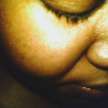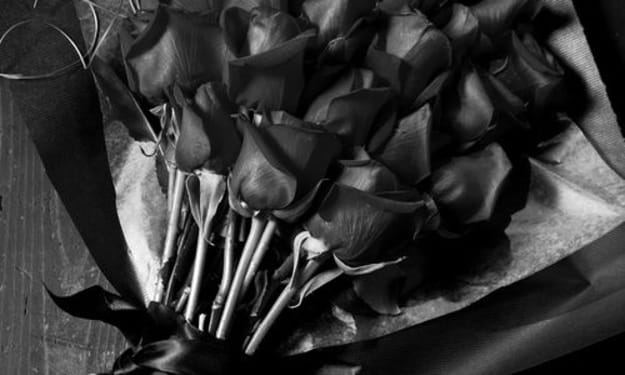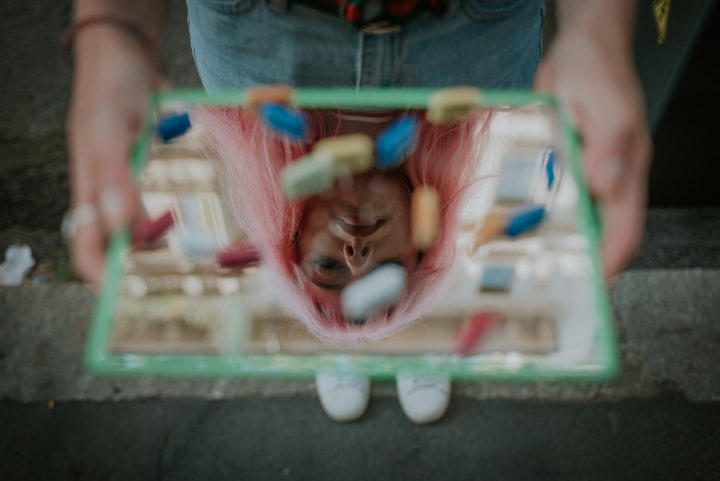Interviews with a Big Black Broad: Session #4
One Woman's Unique Insight into Body Dysmorphic Disorder

Interviewer: How did your collegiate aspirations relate to your experience with BDD?
BBB: Before I begin, I should to warn you that this may be the most bizarre coming of age story you've ever heard. I chose a difficult major in college for two reasons: It was revered as prestigious and lucrative, and I was told that once I graduated from all those years of rigorous study, I would have little to no time for a social life while I practiced my trade. I wanted a career that would keep me so busy that I had no time to dwell on my awful appearance. I also wanted a preoccupation that would provide an understandable reason for why I had no time for romantic relationships—why I would never have children. My plan was to strictly focus on my studies, after which, I'd rely on my friends to satisfy whatever social needs I had. I loved to laugh and discuss politics, philosophy and art. So, I targeted those who majored in these subjects to help me indulge my interests when I wasn't studying my more conservative curriculum. Perhaps every now and then, I would enjoy a casual tryst or two if I was feeling up to it. I'd be a workaholic socialite from now on, I thought. Without time to focus on myself—to obsess over my ugliness, I could avoid what I referred to as "The cloud," which were my severely depressed episodes. My new distractions worked to steady my moods and lessen my obsessions. My grades were almost perfect. I'd even managed to acquire a small but well-coveted grant from the university strictly based on my academic merit. There are ugly people all over the world who are very prosperous, I thought. I studied the careers of very successful, powerful men who were also practicing the trade within the field I was studying. Most of them were single, with few or no children, and no one seemed to criticize their life choices. They weren't stigmatized for not living a conventional life. They were celebrated as playboys in fact. This was one of several observations that solidified my decision to become a playgirl. I could be satisfied with just a great career and friends. No husband. No children. I couldn't really conceive of living what all the other girls had coveted since holding their first doll baby: A "normal" life.
It worked like a charm for a while, until I was unable to avoid my fate of being "the third wheel." Lots of those within my circle of "friends" where starting to pair off with significant others. This left me as the pathetic third wheel on numerous occasions, and it was becoming increasing uncomfortable for me and for them. Also, my cruel jokes were turning stale. My friends had stopped laughing when I'd tell a fat or ugly joke just to break the ice lighten the mood when we were together. More often, they began sarcastically mentioning that it might be time for me to come up with some new material. Also, my verbal self-bashing was morphing into the habit of me offering my very brutal, "honest" opinions of others. I was especially ruthless when it came to commenting on their looks. My commentary during casual conversation was becoming more demeaning and negative, whether my advice was solicited by them or not. I was unconsciously becoming a mean girl. My justification for every verbal beating I dished out was: "Don't get so upset? I'm just keeping it real!" And, as you can imagine, I began to push my friends away one by one. They were tired of being abused by me. Trying to figure me out. Trying to be my friend. They had grown sick of listening to me abuse myself over the months or years we'd known each other. It became clear to them that something was inherently wrong with me. Of course, I knew the root of my growing problems, although I had not yet been diagnosed with BDD at this time. My attempts to hide my mounting mental health issues were beginning to fail.
You would think the alienation of my peers would be enough to make me reconsider my crude actions. Nope. In the end, I rationalized that my personality was just too strong for them. I found a couple of others on campus who were like-minded to chill out with and decided not to waste my time with sensitive types anymore. Besides, they needed some time to grow up and to learn how to accept hard truths about themselves the way I had all those years. Deep down, I had to admit that I missed their companionship when they were gone. As I look back, they were really interesting, great people. They were willing to overlook the fact that I was ugly in order to befriend me, and the only way I could repay them was with insults in order to hide my own insecurities. Pretty fucked up, huh?
Can you describe your worst experience with BDD in college?
*deep breath* They say, you must learn to love yourself if you expect others to follow suit. Clearly, the person who conceived of this phrase had no idea what it was like to suffer from BDD. Once my original circle of friends started to dissipate, save one who would actually proved to be a true friend over the years, my social life started to collapse. Now, besides my school work, I had nothing else to distract me from obsessing over my looks. I found myself standing in front of the mirror more often throughout each day, picking myself apart, crying uncontrollably because there was nothing I could do to change my ugliness. I remember going through a phase where I began wearing full makeup every single day at the suggestion of one of my new friends. "It certainly can't hurt," my friend commented while teaching me how to make up my face one night. When she was done, she went on: "Wow, you can really see the difference." She turned me around to face the mirror, and all I saw was a well made up ugly girl. Someone trying way to hard to be beautiful. But I didn't mention how I felt inside, since she had convinced me that my new look would help attract more friends. So, I started wearing make up everyday.
Whenever I went to parties, with what seemed like hundreds of my peers, I was petrified the entire time. In my mind, everyone was staring at me and thinking: Thatbig, ugly girl looks ridiculous wearing make up and a dress! She'll never fit in with us beautiful people. I was so nervous, I went straight for the alcohol every time. In the span of a month, I went from never having had a sip of beer to drinking several cups of grain alcohol in order to attend a single house party. Otherwise, I'd have to leave after 5 mins, or hide out in the bathroom until the person I came to the party with was ready to leave. One night, I got so drunk at a party and started sweating so badly that my chestnut brown foundation had started to run down my white t-shirt. The person I was rambling on to noticed what was happening during our conversation, but said nothing. He just nodded, smiled, snickered at me every now and then, and let me continue to unknowingly embarrass myself. Because of all the drinking, I had to excuse myself use the bathroom. I cut on the light and caught my horrid reflection in the medicine cabinet mirror. My hands shook as I tried to clean myself up with paper towels. I started to hyperventilate while tears poured down my face. How was I going to face everyone outside this tiny room after this? I thought. I didn't leave the room for almost thirty minutes until I could muster the courage to pull myself together to leave. As a result of this humiliation, I became even more self-conscious when I went anywhere. It would take me hours to make sure my makeup, hair and clothes were perfect before leaving the house. Then, I'd spend more time running back and forth to the bathroom every ten minutes after I got to where I was going to make sure my make up still in tact.
At the beginning of sophomore year, a couple of roommates and I got together and rented a house off campus. When I wasn't running to and from campus to attend class or study at the library, I stayed home in my room. This was the first time I attempted a self-imposed exile. Most days, I felt too ugly to face the world, so I stayed inside. It was just me and my negative inner dialogue day in and day out: You're as wide as a linebacker. You're skin is atrocious. You need a nose job. There is nothing feminine about your look. You don't deserve friends. No man will truly ever want to be with you. I don't want to be you. People who would come to visit the house throughout our time there were beginning to wonder why I was always at home. I told them that I really needed to crack down on my studies to maintain my grade point average. That kept them at bay. But the truth was, my consistent negative thoughts were making it harder for me to focus on my school work and my grades were starting to suffer. I was no longer able to hold on to my part-time job on campus in the evenings and on weekends. I was drinking by myself more often in order to silence my thoughts and to soothe my private pain. Then, eventually, after one semester of struggling through academic probation, I was dismissed from school because my grades had slipped too low by the end of my sophomore year. I was crushed.
After you left college, were you able to busy yourself with work in order to help you cope with BDD?
I tried. But, life thereafter gave me several obstacles that I was in no shape to deal with mentally.






Comments
There are no comments for this story
Be the first to respond and start the conversation.